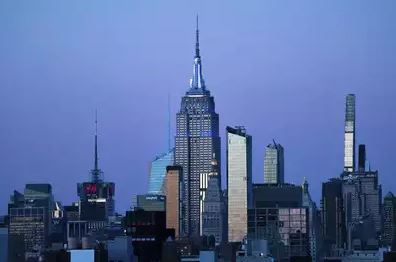While other New York City hotels are being turned into emergency shelters, the iconic Roosevelt Hotel in midtown Manhattan will soon be buzzing again to accommodate an expected inflow of asylum applicants.
Adams maintains that the city is at capacity and has appealed for federal and state funding to accommodate new arrivals.
The mayor added in a statement that New York City has already opened more than 140 emergency shelters and eight large-scale humanitarian assistance centres in addition to this one to address the national catastrophe caused by the Roosevelt decision.
New York Governor Thomas Dewey is said to have falsely claimed victory over Harry Truman for president from the Roosevelt Hotel, which is located near Grand Central Terminal, in 1948.
Vacant hotels are being used to house those in need of a safe place to stay as they figure out their next steps in life as the city is under increasing pressure to expand its shelter system. The Holiday Inn in Lower Manhattan is one such establishment. The 50-story, 500-room hotel announced its closure a few months ago with placards on the lobby windows.
It made financial sense to reopen the hotel as a city-sponsored refuge, according to Scott Markowitz of Tarter Krinsky & Drogin, the hotel’s lawyers.
Markowitz said, “They rent out all the rooms in the hotel at a certain price every night,” and that this generates “substantially more revenue” than business as usual.
When homeless shelters and other alternatives in New York City are full, the city often uses hotels as a temporary solution.
Because of the difficulty of adhering to social distancing guidelines in large group shelters, the city rented out hundreds of hotel rooms as pseudo COVID wards during the epidemic. As the epidemic subsided, fewer people in the city needed to stay in hotels.
Last year, however, hundreds more migrants arrived by bus, and the situation quickly altered.
Migrant families are now being housed at the former 5-star Watson Hotel on West 57th Street, which was praised for its rooftop pool and closeness to Central Park.
As stated in a statement released by the city’s Department of Social Services, “it is our moral and legal obligation to offer shelter to anyone who needs it.” Therefore, “we have used and will continue to use every resource at our disposal to meet the needs of each household and individual whom comes to us seeking shelter.”
Even before the influx of asylum seekers, the city had a homelessness problem, shelters were always full, and there was a lack of cheap housing. The state of New York even revealed plans to house hundreds of migrants in hotels in Orange and Rockland counties, New Jersey, which has angered local officials.
The head of the New York City hotel industry, Vijay Dandapani, has emphasised that the city needs to develop long-term strategies.
He went on to say that “hotels are not the solution for these situations,” since they give the impression to taxpayers that refugees are living lavishly on their dime.
Some homeless activists, however, argue that hotel rooms, with their more private living spaces, are preferable to the barracks-style shelters often provided by cities.
Kassi Keith, 55, a homeless inhabitant of the city, was relieved to hear of the hotel plan.
Dozens of migrants protested earlier this year after being evicted from hotel rooms and sent to makeshift barracks near the Brooklyn Cruise Terminal, which is inconveniently located far from public transit. They were miserable because of the cold, the lack of privacy, and the insufficient number of restrooms.
It was announced last week that the Roosevelt Hotel will operate first as a reference centre for legal and medical matters. Additionally, 850 standard rooms and 175 family rooms will be made available. According to the city, additional 150 rooms will be made available to those seeking refuge.
Executive director of the Coalition for the Homeless David Giffen said, “When you offer people something like a hotel room, you are much more likely to get a positive response to it.”
But Giffen said that hotels wouldn’t do much to solve the larger issue of a shortage of low-cost, long-term accommodation.

